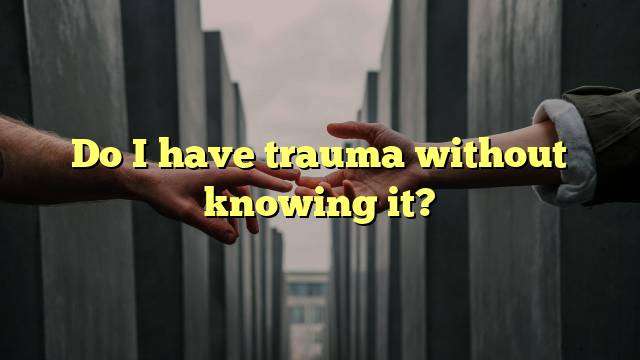Do I Have Trauma Without Knowing It?
Trauma can happen to anyone and at any time. It can be a result of a single event or a series of events. Unfortunately, due to the wide range of trauma experiences, many people may not recognize that they have experienced trauma. While some may think of trauma as something dramatic or life-altering, this is not always the case. Trauma can be both big (large “T”) and small (“small “t”) and can still have a profound impact on how we view ourselves and the world.
What is Trauma?
Trauma is an emotional response to a deeply distressing or disturbing event. It can be caused by a single event or a series of events and can have a long-term psychological effect on a person. Trauma can manifest in physical, psychological, and emotional symptoms, and can be experienced both in the present and as a result of past experiences. Trauma can be experienced both as a direct result of an event, or as a result of the way an event or situation is perceived or interpreted.
Types of Trauma
Trauma can have many different forms and can vary in intensity. Some of the most common types of trauma include:
- Acute Trauma – Acute trauma is an intense, short-term response to a distressing event. It is often associated with physical and psychological symptoms such as shock, fear, and anxiety.
- Chronic Trauma – Chronic trauma is a prolonged response to a distressing event. It is often associated with long-term physical and psychological symptoms such as depression, guilt, and anger.
- Complex Trauma – Complex trauma is a combination of both acute and chronic trauma. It is often associated with long-term, severe physical and psychological symptoms such as dissociation, post-traumatic stress disorder (PTSD), and substance abuse.
- Developmental Trauma – Developmental trauma is a type of trauma that occurs during childhood or adolescence. It is often associated with long-term physical and psychological symptoms such as difficulty forming relationships, difficulty trusting, and difficulty controlling emotions.
Signs and Symptoms of Trauma
The signs and symptoms of trauma can vary greatly depending on the type and severity of the trauma. Some of the most common signs and symptoms include:
- Emotional Symptoms – fear, anxiety, guilt, shame, hopelessness, helplessness, anger, numbness, and sadness.
- Physical Symptoms – headaches, fatigue, difficulty sleeping, muscle tension, racing heart, poor appetite, and nausea.
- Behavioral Symptoms – avoiding certain activities or people, difficulty concentrating, withdrawing from relationships, and engaging in risky behavior.
- Cognitive Symptoms – difficulty remembering, difficulty concentrating, distorted thinking patterns, and intrusive thoughts.
- Spiritual Symptoms – feeling disconnected from a higher power, feeling a lack of purpose, and difficulty finding meaning in life.
How to Recognize Trauma
Recognizing trauma can be difficult, especially if you are not aware of the signs and symptoms. It is important to remember that everyone experiences trauma differently and that some people may not show any signs or symptoms at all. If you are concerned that you may be experiencing trauma, it is important to seek help from a mental health professional. A mental health professional can help you to identify the signs and symptoms of trauma, provide a diagnosis, and create an individualized treatment plan.
Treatment for Trauma
Treatment for trauma is an individualized process and will depend on the type and severity of the trauma. Treatment options can include therapy, medications, and lifestyle changes.
Therapy – Therapy can help to identify and process the trauma, and can help to reduce symptoms of anxiety and depression. Cognitive Behavioral Therapy (CBT) is a type of therapy that can help to identify and change distorted thinking patterns, as well as develop coping strategies.
Medication – Medication can help to reduce symptoms of anxiety, depression, and PTSD. It is important to talk to your doctor or mental health professional if you think that medication may be helpful.
Lifestyle Changes – Making lifestyle changes can help to manage symptoms of trauma. This can include getting regular exercise, eating a healthy diet, maintaining a regular sleep schedule, and engaging in activities that reduce stress.
Conclusion
Trauma can have a profound impact on our lives, even if we are not aware of it. It is important to be aware of the signs and symptoms of trauma, as well as the various treatment options available. If you are concerned that you may be experiencing trauma, it is important to seek help from a mental health professional who can provide an individualized treatment plan.


